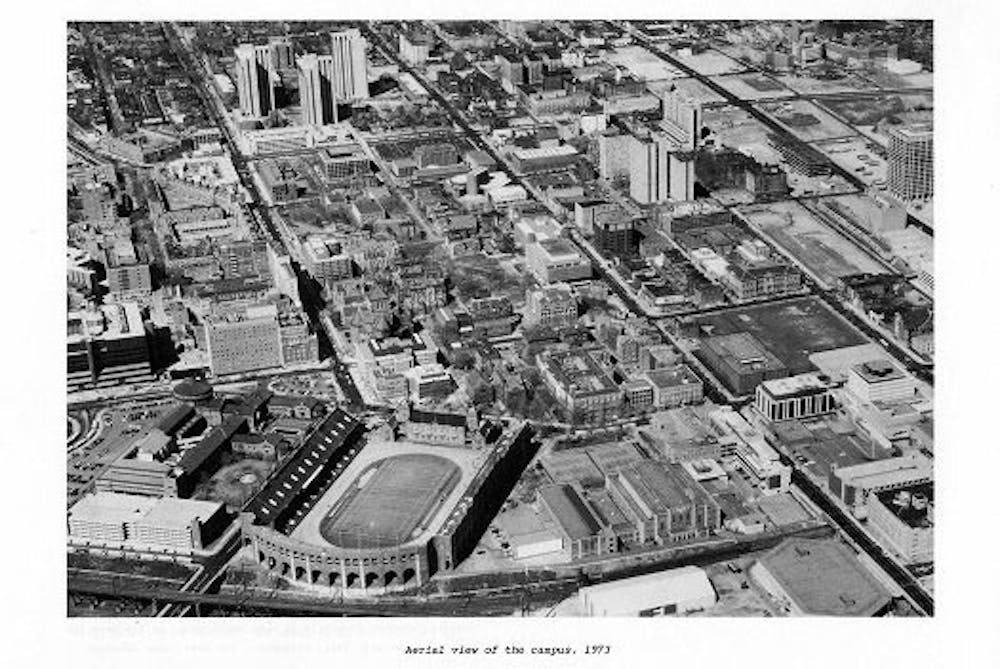
Franklin Field became the home to the Liberty Bell Classic in 1980, when American track and field athletes boycotted the 1980 Olympics.
Credit: Courtesy of Penn ArchivesIn 1980, athletes from the United States and 28 other countries went to Franklin Field instead of the Olympics.
The Olympic Games that summer were to be held in Moscow, in the former Soviet Union. Following the USSR's invasion of Afghanistan, U.S. President Jimmy Carter and various other activists and groups pushed for a boycott, including a writer for The Daily Pennsylvanian, Milton Lewin, in his piece “Boycott the Olympics.” On March 21, 1980, Carter officially announced the decision to athletes gathered at the White House.
“I can’t say at this moment what other nations will not go…” Carter said, adding, “ours will not go. I say that not with any equivocation; the decision has been made.”
An international coalition suggested that athletes from boycotting countries — also including Canada, West Germany, and Japan — compete instead under a neutral banner. Carter responded by threatening to void the American passport of any athlete who attempted such a thing.
So American athletes did not go to the 1980 Olympics. For those who competed in track and field, they instead came to Philadelphia.
The Liberty Bell Classic, like all of the sporting events commissioned by Congress for boycotting countries, was hastily put together. After Congress allotted $10 million dollars for alternative athletic tournaments to be staged in places other than Moscow, Philadelphia was chosen from a slate of four cities. In Philadelphia, Penn’s historic Franklin Field was the chosen site.
There was a certain lack of glamor surrounding the entire situation. A 1980 piece in Sports Illustrated painted the locale of Franklin Field (and Philadelphia as a whole) through a grimy lens. “[O]n Interstate 76, hummed four lanes of traffic; in front, beyond the browning grass of the discus area, was a web of power lines leading from a barely visible substation,” journalist Craig Neff wrote. “Watching in the 96° heat were perhaps 100 people.”
The meet was marked by such weather: intense heat, followed by a sudden thunderstorm that dropped the temperature by 20 degrees, followed again by intense heat the next day. Competition felt weak; many other notable countries such as the United Kingdom, France, and Australia were not competing. The crowd was largely listless.
But it slowly picked up speed and attention. American hurdler Renaldo Nehemiah won the men’s 110-meter hurdles with a time of 13.31 seconds, only .31 off his world record. Villanova senior and local hero Don Paige won the men’s 800m event handily with a time of 1:47.19.
For Americans watching, the Liberty Bell Classic was not only a small point for national pride — the U.S. would win 20 out of the 33 total events — but also historical. Mary Decker, who had finished recovering from an earlier foot injury and was coming off an 18 hour flight, would go on to set a new U.S. record in the women’s 1500m event with a time of 4:00.87.
“I’ve never seen a crowd like this in Franklin Field,” Paige said. “I think it's great they're getting a chance to see what some of the European meets are like.”
Paige’s comments reflect the truth. The Liberty Bell Classic, with athletes participating from 29 different countries, marked the largest track and field event held in the United States since the 1932 Olympics. 20,111 spectators watched in Franklin Field on the final day. Nehemiah’s performance in the 110m hurdles and James Walker’s performance in the men’s 400m hurdles were faster than the gold-medal performances in Moscow.
Despite the event’s billing as an “alternative Olympics,” it was no replacement. Many eligible athletes, including 17 of the 34 champions of the still-held 1980 United States Olympic Trials, declined to attend.
Before the official cancellation, Paige supported the boycott but added, “Deep down, I still believe I’m going, but if we boycott, when it finally hits me, I’ll probably break down and cry.” After winning the 800-meter event at the Liberty Bell Classic and competing in the European season instead of the Olympics, Paige still said of his non-Olympic experience, “There's only one Olympics.”
Still, the Liberty Bell Classic was not only an opportunity for accomplished athletes from boycotting countries to compete, but it also demonstrated the historical mixing of politics and sports.
“People say ‘politics shouldn't be involved in the Olympics,’ but that’s not being realistic,” Paige said, preceding the boycott. “Politics have been a part of every Olympics since 1936.”
And it was at Penn’s Franklin Field, even if against the backdrop of power lines and browning grass, that that fact was clearly illustrated.
The Daily Pennsylvanian is an independent, student-run newspaper. Please consider making a donation to support the coverage that shapes the University. Your generosity ensures a future of strong journalism at Penn.
Donate



